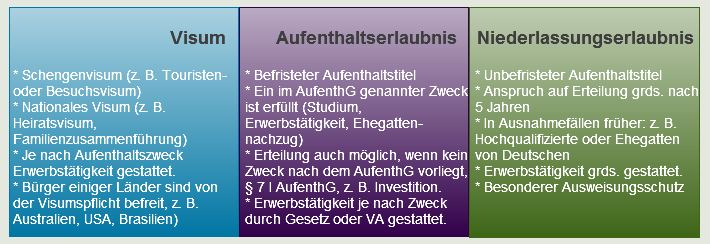Federal Administrative Court, May 22, 2012, Case No.: BVerwG 1 C 8.11
In the German legal context, the term „residence title“ is used differently than in European Community law.
While in the German legal context, visas (both national visas and Schengen visas) are considered residence titles, Community law distinguishes between residence titles on one hand and visas on the other.
The German Residence Act (AufenthG) therefore conclusively lists four different types of residence titles in § 4 (1) sentence 2:
The visa (§ 6 AufenthG)
The residence permit (§ 7 AufenthG)
The settlement permit (§ 9 AufenthG)
- and the permit for permanent residence-EG (§ 9 a AufenthG)
The most important residence titles are illustrated in the following graphic:

Residence titles can, however, be denied or not extended for various reasons.
In the aforementioned decision of the Federal Administrative Court, the issue at hand was whether a recognized refugee could be denied a residence permit if there are facts justifying the conclusion that he supports an organization that supports terrorism.
Case Background
The plaintiff, a Turkish national of Kurdish ethnicity, was recognized as a refugee in Germany in 1996. In the following years, the responsible immigration authority continuously granted him temporary residence permits. However, in February 2010, the defendant decided to reject the plaintiff’s application for a renewal of the humanitarian residence permit granted under § 25 (2) AufenthG.
The rejection was based on the fact that since 2004, the plaintiff had been active in various ways for KONGRA-GEL, considered the successor organization to the banned PKK. Both organizations were classified as terrorist and supported terrorism. Due to these activities, the immigration authority considered the requirements for extending the residence permit unmet.
Decision of the Higher Administrative Court
The plaintiff appealed this decision and succeeded before the Higher Administrative Court (OVG). The OVG acknowledged that the general grounds for denial under § 5 (4) in conjunction with § 54 No. 5 AufenthG were present, as the plaintiff was a member of an organization supporting terrorism. However, the court argued that these provisions were overridden by the special regulation in § 25 (1) sentence 2 in conjunction with (2) sentence 2 AufenthG.
According to this special regulation, a recognized refugee may only be denied a residence permit if he has been expelled for serious reasons of public security and order. Since the plaintiff had not been expelled, the Higher Administrative Court saw no reason to deny the extension of his residence permit.
Appeal to the Federal Administrative Court
The defendant appealed this ruling to the Federal Administrative Court (BVerwG). However, the BVerwG only partially followed the argumentation of the Higher Administrative Court. It clarified that the general ground for denial under § 5 (4) AufenthG applies in principle to the issuance of a residence permit under § 25 (2) AufenthG. However, for recognized refugees, the so-called Qualification Directive (Directive 2004/83/EC) of the European Union must be considered.
This directive generally provides for an entitlement to a residence permit in Article 24 (1). At the same time, Article 21 (3) allows member states to deny a residence title in cases where the principle of non-refoulement under Article 33 of the Geneva Refugee Convention does not apply. However, a refugee cannot invoke the principle of non-refoulement if he is considered a serious threat to the security of the host country.
Referral Back to the Higher Administrative Court
The Federal Administrative Court ruled that the denial of the residence permit is only compliant with EU law if the plaintiff’s behavior poses a significant threat to Germany’s security. Since the Higher Administrative Court had not made sufficient findings regarding the severity of the threat posed by the plaintiff, the Federal Administrative Court could not make a final decision.
Therefore, the case was referred back to the Higher Administrative Court to further clarify the facts and determine whether the conditions of § 5 (4) in conjunction with § 54 No. 5 AufenthG in connection with the heightened threat level of the Qualification Directive are met.
Source: Federal Administrative Court
Important Note: The content of this article has been prepared to the best of our knowledge and belief. However, due to the complexity and constant evolution of the subject matter, we must exclude liability and warranty. Important Notice: The content of this article has been created to the best of our knowledge and understanding. However, due to the complexity and constant changes in the subject matter, we must exclude any liability and warranty.
If you need legal advice, feel free to call us at 0221 – 80187670 or email us at info@mth-partner.de.
Lawyers in Cologne advise and represent you in immigration law.

